|
De Oostenrijkse schrijver Arno Geiger werd geboren op 22 juli 1968 in Bregenz, Vorarlberg. Zie ook alle tags voor Arno Geiger op dit blog en ook mijn blog van 22 juli 2010.
Uit: Zelfportret met nijlpaard (Vertaald door W. Hansen)
“Een paar dagen geleden kwam Judith op de eerste hulp, met een oehoe. Het was onze eerste ontmoeting in bijna tien jaar, en ik herkende haar niet, al had ik haar wel moeten herkennen. Dat lag slechts voor een deel aan haar korte haar, ik werd afgeleid door de oehoe, mdat ik bij de eerste blik al dacht dat het een verloren zaak was. En plotseling zei de vrouw: ‘We kennen elkaar. Ik ben het!’
Ik keek haar aan en herkende haar. Mijn handen trilden, terwijl ik de oehoe onderzocht om me ervan te verzekeren dat mijn eerste indruk juist was geweest. Die valt in een duister gat, hem vangt niemand op. En tegen Judith zei ik: ‘Nou, Judith, er is niets meer aan te doen.’
‘Daar was ik al bang voor,’ zei ze. En alsof er een licht verwijt tussen ons beiden hing, voegde ze er hoofdschuddend aan toe: ‘Hij is niet van mij, ik heb hem bij mijn huis gevonden.’
Ze sloeg haar ogen neer, een ongemakkelijke situatie. De oranje-gele ogen van de oehoe met de zwarte pupillen waren enorm en staarden met een vreselijke uitdrukking in het niets.
Terwijl ik voorbereidingen trof om het dier te doden, wisten we beiden niet wat te zeggen. Vroeger had ik Judith nooit verlegen gezien, ze had altijd gestraald, een en al beweging, het prototype van de ongecompliceerde vrouw, de vrouw die in contactadvertenties wordt gezocht als maatje voor het leven. Ze keek afwisselend naar de grond en opzij.
Ik dacht: nee, we kennen elkaar niet, we hebben elkaar gekend, nu niet meer, nu zijn we een raadsel voor elkaar.
Die vervreemding was verrassend snel gekomen, parallel aan het verdwijnen van de openhartigheid. Op de dag nadat we uit elkaar waren gegaan had ik zo goed als niets meer gemerkt van de normale vertrouwdheid, en dat bleef zo bij elk weerzien. We wisten niet eens meer hoe we elkaar moesten groeten.”
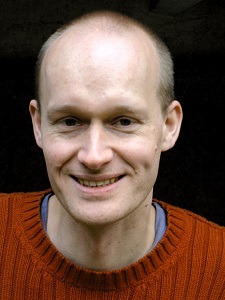
Arno Geiger (Bregenz, 22 juli 1968)
De Amerikaanse schrijfster Susan Eloise Hinton werd geboren op 22 juli 1948 in Tulsa, Oklahoma. Zie ook alle tags voor Susan Hinton op dit blog.
Uit: The Outsiders
“Greasers can’t walk alone too much or they’ll get jumped, or someone will come by and scream “Greaser!” at them, which doesn’t make you feel too hot, if you know what I mean. We get jumped by the Socs. I’m not sure how you spell it, but it’s the abbreviation for the Socials, the jet set, the West-side rich kids. It’s like the term “greaser,” which is used to class all us boys on the East Side.
We’re poorer than the Socs and the middle class. I reckon we’re wilder, too. Not like the Socs, who jump greasers and wreck houses and throw beer blasts for kicks, and get editorials in the paper for being a public disgrace one day and an asset to society the next. Greasers are almost like hoods; we steal things and drive old souped-up cars and hold up gas stations and have a gang fight once in a while. I don’t mean I do things like that. Darry would kill me if I got into trouble with the police. Since Mom and Dad were killed in an auto wreck, the three of us get to stay together only as long as we behave. So Soda and I stay out of trouble as much as we can, and we’re careful not to get caught when we can’t. I only mean that most greasers do things like that, just like we wear our hair long and dress in blue jeans and T-shirts, or leave our shirttails out and wear leather jackets and tennis shoes or boots. I’m not saying that either Socs or greasers are better; that’s just the way things are.
I could have waited to go to the movies until Darry or Sodapop got off work. They would have gone with me, or driven me there, or walked along, although Soda just can’t sit still long enough to enjoy a movie and they bore Darry to death. Darry thinks his life is enough without inspecting other people’s. Or I could have gotten one of the gang to come along, one of the four boys Darry and Soda and I have grown up with and consider family. We’re almost as close as brothers; when you grow up in a tight-knit neighborhood like ours you get to know each other real well. If I had thought about it, I could have called Darry and he would have come by on his way home and picked me up, or Two-Bit Mathews—one of our gang—would have come to get me in his car if I had asked him, but sometimes I just don’t use my head. It drives my brother Darry nuts when I do stuff like that, ’cause I’m supposed to be smart; I make good grades and have a high IQ and everything, but I don’t use my head. Besides, I like walking.”
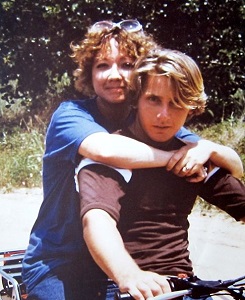
Susan Hinton (Tulsa, 22 juli 1948)
Hinton en de acteur Emilio Estevez die Two-Bit Matthews speelt in de gelijknamige film uit 1983.
De Indiase schrijver en journalsit Manu Joseph werd geboren op 22 juli 1974 geboren in Kottayam en groeide op in Chennai. Zie ook alle tags voor Manu Joseph op dit blog.
Uit: Serious Men
“From behind, a girl with a bouncing pony tail and an iPod strung to her ears overtook him. Through her damp T-shirt he could see her firm youthful back. He quickened his pace, and regained his lead over her. And he tried to look at her face in the hope that she was not pretty. Beautiful women depressed him. They were like Mercedes, BlackBerry phones and sea-view homes. The girl met his eyes for an instant and looked away without feeling flattered. She had a haughty face that would be a pleasure to tame. With love, poetry or a leather belt, perhaps. Whatever she liked. Her face did not show anything, but it did grow more cold. She was aware that she was being watched, not just by a strange brisk man but also by the unending hordes of miserable people all around who spread dengue and scratched her car. They were always there on the fringes of her world, gawking at her the way stray dogs look at good stock. Ayyan slowed down and let her march ahead. A few feet away, a man stood still and stared at her. His head moved from left to right as she passed him. He was a short man who appeared to stand erect because his back was not long enough. Ayyan knew from the tension in his shirt that it was tucked straight into the underwear for a tighter grip. (The secret fashion of many men he knew.) A thin brown belt ran around his slender waist almost twice. His shirt pocket sagged under the weight of the many things it held. A red comb peeped from the back pocket of his trousers. 'Stop staring at that girl,' Ayyan said. The little man was startled. He then opened his mouth in a sporting but silent laugh. Transient strings of saliva ran from the upper jaw to the lower.
They went to one of the pink concrete benches that were dedicated to the memory of a departed member of the Rotary Club. 'Busy day,' the man said, flapping his thighs. 'I'm travelling. That's why I troubled you, Mani. I wanted to settle this fast.' It's all right, my friend,' Ayyan said, 'The important thing is that we have managed to meet.' He took out a piece of printed paper and handed it to him. 'All the details are in this,' Ayyan said. The man studied it more carefully than he probably wanted to. And he tried to appear nonchalant when the envelope full of cash was thrust towards his chest. After the little man left, with quick hectic steps to emphasize that he was busy, Ayyan continued to sit on the bench and stare. The game has to escalate, he told himself. It has to move to a different level. In a way, what he had just done was cruel. It was probably even a crime. But what must a man do? An ordinary clerk stranded in a big daunting world wants to feel the excitement of life, he wants to liberate his wife from the spell of jaundice-yellow walls. What must he do?”
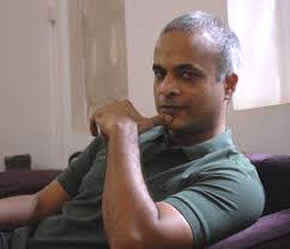
Manu Joseph (Kottayam 22 juli 1974)
De Amerikaanse dichter en schrijver Stephen Vincent Benét werd geboren op 22 juli 1898 in Bethlehem, Pennsylvania. Zie ook alle tags voorStephen Vincent Benét op dit blog en ook mijn blog van 22 juli 2010.
Nos Immortales
Perhaps we go with wind and cloud and sun,
Into the free companionship of air;
Perhaps with sunsets when the day is done,
All's one to me -- I do not greatly care;
So long as there are brown hills -- and a tree
Like a mad prophet in a land of dearth --
And I can lie and hear eternally
The vast monotonous breathing of the earth.
I have known hours, slow and golden-glowing,
Lovely with laughter and suffused with light,
O Lord, in such a time appoint my going,
When the hands clench, and the cold face grows white,
And the spark dies within the feeble brain,
Spilling its star-dust back to dust again.
Campus Sonnets: Return - 1917
'The College will reopen Sept. -.'
`Catalogue'.
I was just aiming at the jagged hole
Torn in the yellow sandbags of their trench,
When something threw me sideways with a wrench,
And the skies seemed to shrivel like a scroll
And disappear . . . and propped against the bole
Of a big elm I lay, and watched the clouds
Float through the blue, deep sky in speckless crowds,
And I was clean again, and young, and whole.
Lord, what a dream that was! And what a doze
Waiting for Bill to come along to class!
I've cut it now - and he - Oh, hello, Fred!
Why, what's the matter? - here - don't be an ass,
Sit down and tell me! - What do you suppose?
I dreamed I . . . am I . . . wounded? 'You are dead.'
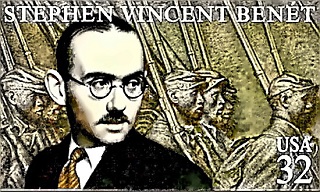
Stephen Vincent Benét (22 juli 1898 – 13 maart 1943)
De Amerikaanse schrijver Tom Robbins werd geboren op 22 juli 1936 in Blowing Rock, North Carolina. Zie ook alle tags voor Tom Robbins op dit blog en ook mijn blog van 22 juli 2010.
Uit:Fierce Invalids Home from Hot Climates
“All depression has its roots in self-pity, and all self-pity is rooted in people taking themselves too seriously."
At the time Switters had disputed her assertion. Even at seventeen, he was aware that depression could have chemical causes.
"The key word here is roots," Maestra had countered. "The roots of depression. For most people, self-awareness and self-pity blossom simultaneously in early adolescence. It's about that time that we start viewing the world as something other than a whoop-de-doo playground, we start to experience personally how threatening it can e, how cruel and unjust. At the very moment when we become, for the first time, both introspective and socially conscientious, we receive the bad news that the world, by and large, doesn't give a rat's ass. Even an old tomato like me can recall how painful, scary, and disillusioning that realization was. So, there's a tendency, then, to slip into rage and self-pity, which if indulged, can fester into bouts of depression."
"Yeah but Maestra - "
"Don't interrupt. Now, unless someone stronger and wiser - a friend, a parent, a novelist, filmmaker, teacher, or musician - can josh us out of it, can elevate us and show us how petty and pompous and monumentally useless it is to take ourselves so seriously, then depression can become a habit, which, in tern, can produce a neurological imprint. Are you with me? Gradually, our brain chemistry becomes conditioned to react to negative stimuli in a particular, predictable way. One thing'll go wrong and it'll automatically switch on its blender and mix us that black cocktail, the ol' doomsday daiquiri, and before we know it, we're soused to the gills from the inside out. Once depression has become electrochemically integrated, it can be extremely difficult to philosophically or psychologically override it; by then it's playing by physical rules, a whole different ball game. That's why Switters my dearest, every time you've shown signs of feeling sorry for yourself, I've played my blues records really loud or read to you from The Horse's Mouth. And that's why when you've exhibited the slightest tendency toward self-importance, I've reminded you that you and me - you and I: excuse me - may be every bit as important as the President or the pope or the biggest prime-time icon in Hollywood, but none of us is much more than a pimple on the ass-end of creation, so let's not get carried away with ourselves. Preventive medicine, boy. It's preventive medicine."
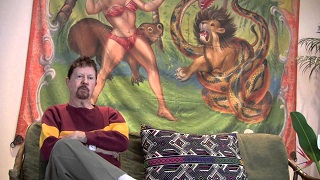
Tom Robbins (Blowing Rock, 22 juli 1936)
Zie voor nog meer schrijvers van de 22e juli ook mijn vorige blog van vandaag.
|



